Suriname, officially named the Republic of Suriname is a country in northern South America. Suriname is one of four non-Spanish-speaking states in South America along with Guyana, which is Anglophone, Brazil, which is a Portuguese-speaking nation, and French Guiana, which is Francophone.
Suriname was formerly known as Nederlands Guyana, Netherlands Guiana or Dutch Guiana. Suriname is situated between French Guiana to the east and Guyana to the west. The southern border is shared with Brazil and the northern border is the Atlantic coast. The southernmost border with French Guiana is disputed along the Marowijne river; while the once-disputed boundary with Guyana was arbitrated by the United Nations Convention on Law of the Sea on September 20, 2007. The country is the smallest sovereign state in terms of area and population in South America and is the only independent Dutch-speaking nation in the Western Hemisphere (Aruba and the Netherlands Antilles are still Dutch dependencies.)
Principal Government Officials
President—Ronald Venetiaan
Vice President—Ramdien Sardjoe
Key Economic Indicators:
- GDP (2007 est.): U.S. $2.23 billion (Source: IMF).
- Annual growth rate real GDP (2006 est.): 5.8%.
- Per capita GDP (2006 est.): U.S. $4,000.
- Inflation (2006): 5.6%.
- Natural resources: Bauxite, gold, oil, iron ore, other minerals; forests; hydroelectric potential; fish and shrimp.
- Agriculture: Products--rice, bananas, timber, and citrus fruits.
- Industry: Types--alumina, oil, gold, fish, shrimp, lumber.
- Trade (Source: IMF): Exports (2006)-- US $1.391 billion: alumina, gold, crude oil, wood and wood products, rice, bananas, fish, and shrimp. Major markets (2005) --Norway (23.9%), U.S. (16.8%), Canada (16.4%), France (8.1%), Iceland (2.9%). Imports (2006)--US $1.2 billion: capital equipment, petroleum, iron and steel products, agricultural products, and consumer goods. Major suppliers (2005)--U.S. (24.4%), Netherlands (14.5%), Trinidad and Tobago (10.5%), Japan (4.3%), China (5.4%), Brazil (3.6%).
Economic Outlook:
The economy is dominated by the mining industry, with exports of alumina, gold, and oil accounting for about 85% of exports and 25% of government revenues, making the economy highly vulnerable to mineral price volatility. The short-term economic outlook depends on the government's ability to control inflation and on the development of projects in the bauxite and gold mining sectors. Suriname has received aid for these projects from Netherlands, Belgium, and the European Development Fund. Suriname's economic prospects for the medium term will depend on continued commitment to responsible monetary and fiscal policies and to the introduction of structural reforms to liberalize markets and promote competition. In 2000, the government of Ronald VENETIAAN, returned to office and inherited an economy with inflation of over 100% and a growing fiscal deficit. He quickly implemented an austerity program, raised taxes, attempted to control spending, and tamed inflation. These economic policies are likely to remain in effect during VENETIAAN's third term. Prospects for local onshore oil production are good as a drilling program is underway. Offshore oil drilling was given a boost in 2004 when theState Oil Company (Staatsolie) signed exploration agreements with Repsol, Maersk, and Occidental. Bidding on these new offshore blocks was completed in July 2006.
Investment
Suriname does not have a foreign investment code. In an effort to attract new investment, the government negotiates each investment project individually, offering incentives such as special tax holidays, depending on the project. Economic and business relations with the United States are very important to this nation. US firms operating in Suriname include Suralco, the bauxite company, Exxon, Texaco, IBM, and the insurance firm, Alico. In addition, Suriname is highly dependent on relations with the Dutch government.
Suriname - United States Relations
Suriname-United States relations are bilateral relations between Suriname and the United States. Since the reestablishment of a democratic, elected government in 1991, the United States has maintained positive and mutually beneficial relations with Suriname based on the principles of democracy, respect for human rights, rule of law, and civilian authority over the military. To further strengthen civil society and bolster democratic institutions, the U.S. has provided training regarding appropriate roles for the military in civil society to some of Suriname's military officers and decision makers. In addition, narcotics trafficking organizations are channeling increasing quantities of cocaine through Suriname for repackaging and transport to Europe and the United States, and of ecstasy for transport to the United States. To assist Suriname in the fight against drugs and associated criminal activity, the U.S. has helped train Surinamese anti-drug squad personnel. The U.S. and Suriname also have significant partnerships in fighting trafficking in persons and money laundering.
Since 2000, the U.S. has donated a criminal records database to the police as well as computers, vehicles, and radio equipment. Projects through which the U.S. has supported the judicial system include case management and computer hardware donation. Along with training projects, these programs have led to a strong relationship with law enforcement entities in Suriname.
The U.S. Peace Corps in Suriname works with the Ministry of Regional Development and rural communities to encourage community development in Suriname's interior.
Suriname is densely forested and increased interest in large-scale commercial logging and mining in Suriname's interior have raised environmental concerns. The U.S. Forest Service, the Smithsonian, and numerous non-governmental environmental organizations have promoted technical cooperation with Suriname's government to prevent destruction of the country's tropical rain forest, one of the most diverse ecosystems in the world. U.S. experts have worked closely with local natural resource officials to encourage sustainable development of the interior and alternatives such as ecotourism. On December 1, 2000, UNESCO designated the 16,000 square kilometers Central Suriname Nature Reserve as a World Heritage Site. Suriname's tourism sector remains a minor part of the economy, and tourist infrastructure is limited (in 2004, some 145,000 foreign tourists visited Suriname).
Suriname's efforts in recent years to liberalize economic policy created new possibilities for U.S. exports and investments. The U.S. remains one of Suriname's principal trading partners, largely due to ALCOA's longstanding investment in Suriname's bauxite mining and processing industry. Several U.S. corporations represented by Surinamese firms acting as dealers are active in Suriname, largely in the mining, consumer goods, and service sectors. Principal U.S. exports to Suriname include chemicals, vehicles, machine parts, meat, and wheat. U.S. consumer products are increasingly available through Suriname's many trading companies. Opportunities for U.S. exporters, service companies, and engineering firms will probably expand over the next decade.
Suriname is looking to U.S. and other foreign investors to assist in the commercial development of its vast natural resources and to help finance infrastructure improvements. Enactment of a new investment code and intellectual property rights protection legislation which would strengthen Suriname's attractiveness to investors has been discussed; the investment law was approved by the National Assembly and is currently being revised by the Ministry of Finance.
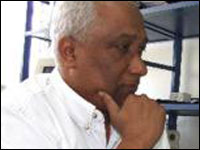 Eddy JoemmankhanGeneral ManagerAcademic Hospital Paramaribo
Eddy JoemmankhanGeneral ManagerAcademic Hospital Paramaribo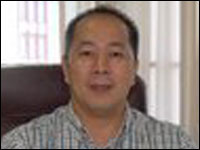 Gerard LauFinancial DirectorN.V. Energie Bedrijven Suriname
Gerard LauFinancial DirectorN.V. Energie Bedrijven Suriname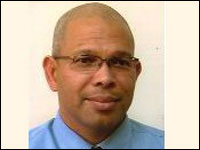 Dirk CurrieManaging DirectorTelesur
Dirk CurrieManaging DirectorTelesur Stephen ComvaliusManaging DirectorStichting Staatsziekenfonds Suriname
Stephen ComvaliusManaging DirectorStichting Staatsziekenfonds Suriname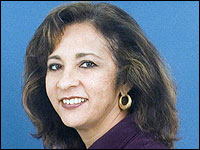 Djaienti HindoriActing PresidentLandbouwbank
Djaienti HindoriActing PresidentLandbouwbank Henk D. JessurunPresidentSurinam Airways
Henk D. JessurunPresidentSurinam Airways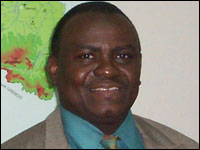 Dr. Celsius WaterbergMinisterHealth
Dr. Celsius WaterbergMinisterHealth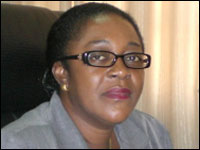 Richel ApinsaMinister of TransportCommunication and Tourism
Richel ApinsaMinister of TransportCommunication and Tourism Rudi D. SardjoeExecutive PresidentRudisa
Rudi D. SardjoeExecutive PresidentRudisa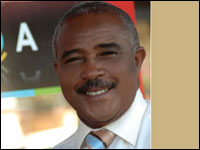 Tyrone AlbertoCEOUNIQA
Tyrone AlbertoCEOUNIQA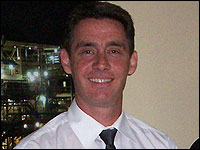 Renaud AdamsVice-President and General ManagerIAMGOLD
Renaud AdamsVice-President and General ManagerIAMGOLD Amichand JhauwManaging DirectorBlue Wing Airlines
Amichand JhauwManaging DirectorBlue Wing Airlines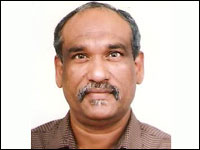 Danny WilliamManaging DirectorCKC Motors
Danny WilliamManaging DirectorCKC Motors S. KuldipsinghPresidentKuldipsingh
S. KuldipsinghPresidentKuldipsingh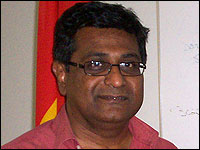 Kermechend RaghoebarsingMinister of AgricultureLivestock and Fisheries
Kermechend RaghoebarsingMinister of AgricultureLivestock and Fisheries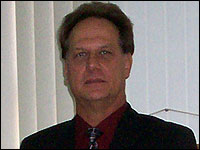 Ricardo van RavenswaayMinisterPlanning & Development
Ricardo van RavenswaayMinisterPlanning & Development Martinus ApartmentsTourism
Martinus ApartmentsTourism Residence InnTourism
Residence InnTourism Van Alen´s Beton IndustrieConstruction
Van Alen´s Beton IndustrieConstruction The Kuldipsingh GroupConstruction
The Kuldipsingh GroupConstruction StaatsZiekenFonds SurinameHealth
StaatsZiekenFonds SurinameHealth Academic Hospital ParamariboHealth
Academic Hospital ParamariboHealth N.V. Energie Bedrijven SurinameEnergy
N.V. Energie Bedrijven SurinameEnergy Rudisa InternationalHolding Groups
Rudisa InternationalHolding Groups Surinam AirwaysTransport
Surinam AirwaysTransport Blue Wing AirlinesTransport
Blue Wing AirlinesTransport TelesurTransport
TelesurTransport